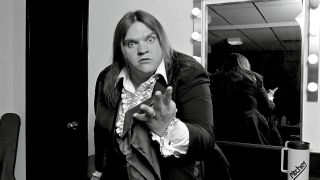Dead Ringer was not supposed to have been Meat Loaf’s second album. That was supposed to have been Renegade Angel, the record that Jim Steinman conceived and wrote as the planned follow-up to Bat Out Of Hell. But then, for the longest time, it seemed no one had wanted a Meat Loaf-Steinman record full-stop.
Born Marvin Lee Aday in Dallas, Texas in 1947 to a schoolteacher mother and alcoholic cop father, Meat Loaf was a nickname given to him by a high-school football coach on account of his bulk. In the mid-60s he fled the trials of his home life for LA. Also possessing an oversized voice, he knocked around the West Coast in a succession of bands before joining the cast of the LA production of the hit musical Hair, which subsequently transferred to Broadway.
It was in New York that he met Steinman, while auditioning in 1973 for a part in another musical that the latter had co-written, titled More Than You Deserve. Prodigiously talented, Steinman was also somewhat enigmatic, shy and socially awkward, but in his larger-than-life new acquaintance he’d found his muse.
The two men began work on Bat Out Of Hell in 1974, Meat Loaf giving voice to Steinman’s titanic songs originally conceived for a musical he had developed based on JM Barrie’s Peter Pan stories. Their finished work was a near-perfect distillation of Steinman’s vision, a rock opera to teenage angst. But it was initially rejected by every record label they shopped it to. It finally found a home at an inauspicious indie label, Cleveland International, that had been swallowed by the huge Sony Corporation. But from the album’s release in 1977, it started to sell like hot cakes. Meat Loaf was sent out on the road, with Steinman playing piano in his band, doing shows six nights a week – which was when the trouble started.
Steinman said later: “I tried to get the label to rest Meat’s voice, this great instrument, which they were making do a show a night like a bar band’s singer. He just wrecked his voice really quickly.”
Physically and emotionally burnt out after 10 straight months of touring, Meat Loaf eventually took matters into his own hands at a gig in Ottawa, Canada. During the encore, he took a running jump from the 20-foot-high stage and broke his leg, bringing the tour to an abrupt end. “They should have told me to go into a padded cell,” he noted some years afterwards. “I was a lunatic.”
- Meat Loaf: The Long Hard Road Out Of Hell
- Meat Loaf albums ranked from worst to best
- Meat Loaf's strict health regime after collapsing on stage
- Interview: Meat Loaf on The Who, Joe Cocker, Edward Norton and the MC5
Freed from the grind of roadwork, Steinman was able to write new songs. Just like those on Bat Out Of Hell, these were again located in a fantastical rock’n’roll Neverland of sex, cars and ageless youth. And at their best, as on the imperious Surf’s Up, they were also every bit as brilliantly bombastic. He titled it Renegade Angel and had Meat Loaf join him in the studio. However, the enterprise came to a crashing end. “I spent seven months trying to make a follow-up with him,” Steinman said. “He had lost his voice, he had lost his house and he was pretty much losing his mind.”
“It was psychosomatic at first, because I didn’t want to do it,” Meat Loaf said of his inability to sing. “[But] I freaked myself out so bad that when I tried to do it I couldn’t. I’d also started smoking, and I don’t have a voice that can stand that sort of thing.”
Steinman decided to record the LP himself.
Released in April 1981 as Bad For Good, Steinman’s first and last solo album was a Wagnerian epic rendered impotent by his own piss-weak voice. Meat Loaf seethed at what he saw as an act of betrayal. But Steinman tossed him five more new songs he had written in the intervening period, plus two he reworked.
Treatments from a therapeutic masseur in LA had somehow enabled Meat Loaf to sing again, and backed by an all-star band, including pianist Roy Bittan and drummer Max Weinberg from Bruce Springsteen’s E Street Band, he went into the Record Plant studio in New York to record his belated new album.
Progress was slow, Meat Loaf’s shattered confidence requiring co-producer Stephen Galfas to painstakingly splice and build up his vocal tracks phrase by phrase. Dead Ringer was finally released five months after Bad For Good. But though it sailed to No.1 in the UK, it flopped in the US and was generally unloved. Rolling Stone dismissed it in a curt, two-star review as “alarmingly awful”.
And yet, regarded aside from the shadow of Bat Out Of Hell, Dead Ringer was a worthy successor to it. Certainly it’s the only other record Meat Loaf and Steinman have made since, together or apart, that has come within touching distance of its greatness. The near-title track, on which Meat Loaf traded lines with Cher, was an obvious high point at the time, but other songs have aged better. Two in particular, I’m Gonna Love Her For Both Of Us and I’ll Kill You If You Don’t Come Back, marry young lust to crashing, surging, symphonic soundtracks with the same degree of heightened and thrilling bravura as either of the wondrous Hot Summer Night or Paradise By The Dashboard Light.
Meat Loaf’s brittle voice, buoyed by banks of backing vocals, occasionally wavers, and once he talked of re-recording Dead Ringer. For now, though, it’s still overlooked and underappreciated. And perhaps it always will be, since for him at least it appears too painful to go back to. He was, he said, in the midst of a nervous breakdown when recording it, telling the LA Times in 1993: “I was an angry, violent guy who was out of control. I didn’t know how to deal with being popular. I didn’t know how to deal with a lot of things.”
By then, after legal battles with his ex-manager and Steinman, and having had himself declared bankrupt, Meat Loaf had recovered his bearings. He and Steinman made up and released Bat Out Of Hell II: Back Into Hell, which went on to be a smash hit. It may be the official sequel, but it’s a poor relation to their black sheep, Dead Ringer.


